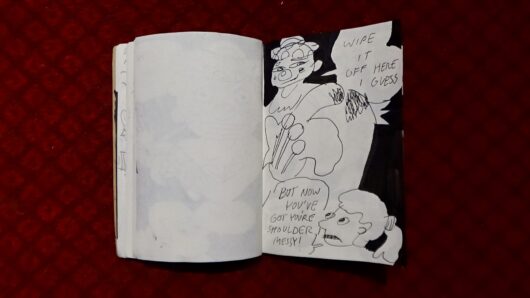Talking Toys and Talking Zines with Zeel Posted on
Longtime collaborator of Benjamin Pollock’s Toyshop Geoff Coupland aka Mr Zeel talks to Chiara about zines. Geoff runs the seminal Comic Club at Camberwell Art College with Peony Gent & Joe Kessler
Alongside zine and toy making Geoff teaches illustration and has participated in our current exhibition ‘Talking Toys’ where the In-Heritage Group of the UAL responds to antique and vintage toys from Pollocks.
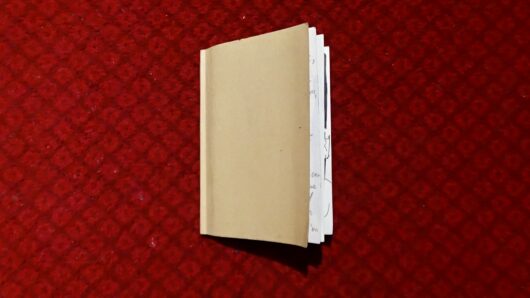
“You’ve been Clowned!” A Zine by Orson
Chiara: Hey Geoff, thanks for dedicating us some time to chat about zines in light of Benjamin Pollock’s Toyshop’s campaign! First of all, would you like to tell us more about your relationship to zine-making? How did you discover and develop an interest in the practice in the first place?
Geoff: My first love art-wise is comics, and there is a close relationship between comics and zine-making. Comics usually are much harder work, and for me need a lot more planning. So sometimes a zine is what is called for when a looser, quicker mode of small-booklet creation is needed. A zine can be about anything, and sorta done in any way you please, so the stakes are low, as nobody is expecting a really high production standard. That means that you can be liberated to make and let things come together in a more intuitive, organic manner. Zines are the book construction analogue of improvised music, and thus, making zines can be free and secure within certain comforting parameters.
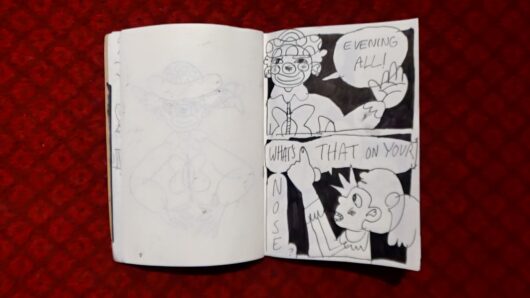
“You’ve been Clowned!” A Zine by Orson
Chiara: Regarding your own work, what kinds of zines have you focused on throughout your career?
- Exploring themes: zines that are about a specific thing I like – I dunno – The Film Repo man/Haircuts in Barcelona/A trip from Berlin to Sachsenhausen/Oakwood in North London, etc.
- Group projects: A bunch of zinesters can make a zine in a very, very short time. Many hands making light work. But the work of making a group zine in a short time can also be very satisfying.
- Mini Comics: A good place to put small comics or silly comics or fragments of comics that otherwise would not be used in a “Proper Comic”.
- Chucking stuff together: Like the zine is just a receptacle of random stuff. Sometimes it can be really liberating to “not give a stuff”. Sometimes these “receptacle” zines are really good, it depends on what the zinemaker has to work with, though!
- Zines that were fun in the moment but don’t stand up now, or are only relevant at that particular time: I did a zine workshop just at the start of Covid with around four others who turned up at the Pelican in Peckham, before we really knew what was going on. Looking back at it now, it seems sorta quaint and naïve, and a bit inaccurate. But that’s OK! A zine can be an encapsulation of a moment! That zine was not even printed out, it was transmitted in germ-free digital form.
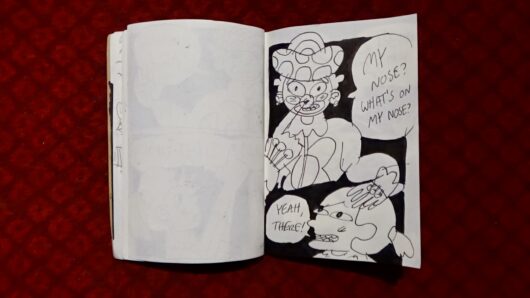
“You’ve been Clowned!” A Zine by Orson
Chiara: While researching the topic, I have noticed how most sources consider zine-making a practice approximately originating in the early 20th century USA. What do you think about this, given how “open” the nature of zines is? Is it even possible to precisely pinpoint when and where the first types of zines appeared? I feel as if we could probably think of much earlier examples of handmade booklets than the 1900s.
Geoff: This is my nerd rant on this subject: I think that the statement that zine making is originating in 1920s United States is perhaps contentious. It seems to me difficult to say that when the term ‘fanzine’ was coined by Russ Chauvenet in the October 1940 issue of his fanzine Detours. Also prior to 1940 – from the invention of printmaking onwards (and before that as we should also consider printmaking in places such as South East Asia) – as soon as anyone worked out how to make more than one copy of any book form really cheaply, individuals and/or groups have been making zine-like book-forms that delivered a group/personal impression of the world and how they see it for a myriad of personal, fun, cultural, political, practical, disseminative reasons. These are just a few of them: broadsides, penny dreadfuls, pamphlets, scrapbooks, samizdat, school/prison/church/club/political activist small magazines and newsheets, Dada and Futurist manifestos, etc. Yes, we can say that, at a certain point, making small enthusiast-books was recognised as ‘zines’. But it kinda just gave a name to something that had been going on from the first days of printmaking, whenever that was. Ancient China probably. Also, what folks call zine-making nowadays has expanded to encompass all sorts of territory that the original term ‘zine’ was not working within. It’s now an umbrella term for small press booklet or therapeutic bookwork or whatever you wish to do in a small booklet that has a limited edition of copies.
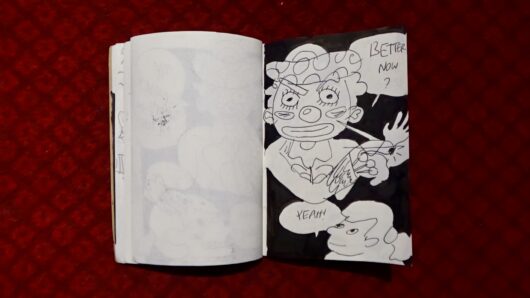
“You’ve been Clowned!” A Zine by Orson
Chiara: Zines have always played a fundamental role in history within subcultures and underrepresented groups: what do you think makes zines so accessible?
Geoff: Making zines is accessible, but accessing specific zines is often not so easy, as they are limited edition, or perhaps part of sub-cultural activities that may be difficult to notice outside of said sub-cult. That is where zine distribution services (mail/order/and now the internet) come into play. My friend and ex-student Peter Willis has a great shop called BOOKS PECKHAM he is an authority on this subject. They will soon be a Doctor (Phd) of zines.
But in terms of zine making being easy to access as an activity:
- Necessity: Sometimes you just feel like you “have to” make a zine. This is exciting and helps the work flow.
- Time: Zines are quick to make when you are motivated by excitement or momentum of a deadline, or a group impetus. Books or really involved comics are a bigger chunk of work and take longer to process, create and check and print properly.
- Need to be “seen”: If you are just starting out as an artist, it can be difficult to find “your audience” and it’s easy to feel like there is no place for your tiny voice. Making zines, giving them out, selling them cheap – or stickering/graffiti (don’t do anything illegal, folks!). All this can help you feel like you are part of the world, of a scene, of a city, of an online community, etc.
- Need to find a voice and communicate: Often groups or individuals have important subjects to discuss about or ideas to voice, whether political, spiritual, rhetorical, fringe or otherwise. Zines are good to help “the small people” have their say! This goes back to the days of broadsides/pamphlets/samizdat. Sometimes stuff just gotta be said.
Chiara: As a teacher, what advice would you give people who do not consider themselves “good enough” to get started with zine-making? How would you help them “break the ice” with it?
Geoff: This is kind of a funny question, because zine making has always been the welcoming space where zero skill is required, and often too much skill can be just embarrassing or surplus to requirements. Zinery is something that everyone can do and it sorta doesn’t matter if you are “good” or not. Zinery has always been for the lowest of the low and the most marginalised of non-artist-artists. So the bar to making zines should be non-existent. However, my advice would be to: Decide on a small mission, Play, Be simple, Make simple rules for yourself and follow them.
- Play: make a bunch of random drawings or collages or take random photos or write “from you under-mind” just muck about (but try and work quite hard at playing at the same time , be in a “flow state” if you can manage it. Then look at them again a few days later and say to yourself- what are these about? Then do some more. If you allow yourself, a theme will emerge that can form a zine.
- Be Simple- don’t try and make a cathedral when a wooden shed is all that is required. It’s only a zine. A zine can be 2 pages or 24 or more. Zines don’t need to be much longer than that. Also zines are usually black and white. So colour is another thing you don’t need to worry about.
- Set rules- Setting the page count/The size/The format/ The print process/ Whether there is colour or not, whether its collage / whether its all drawn with one pen/ whether mistakes are left in or not/ all these things help make things simple and start to form the zine, and when its fully formed, its done!
- Decide on a mission- Set a simple theme – for example “12 Flowers/ One day in London told only through drawing training shoes/ Seven deadly sins/ What I saw in Lidl today/ Why I hate Boris Johnson/ Why homeless people need help/ “ these are zine themes that kinda construct themselves.
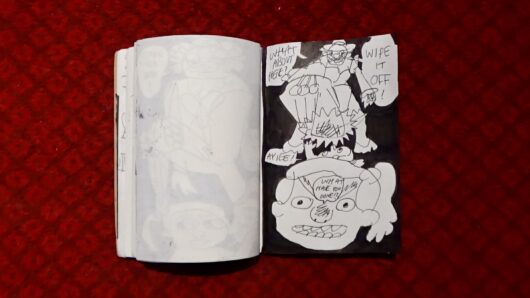
“You’ve been Clowned!” A Zine by Orson
Chiara: What are some of your favourite zines out there and why?
Geoff: Every year some students make great zines at the place I teach, I have hundreds of them:
- Donald Parsnips Daily Journal by Adam Dant. He did a zine almost every day for a year! Funny! Clever!
- Melonfarmer: A series of zines made in collaboration with my son Orson from about 5 years old onwards. He taught me a lot.
- Orson’s Crunchy Bat zine: Zines are such a personal form, so much about community. I love it when Orson makes zines and stuff now, as I get all the little inside jokes and references. How many books do you have where you know the author that well!? Zines rule!
- Juggling: I have a zine made by a student from about 13 years ago, and it’s so full of joy and so simple. A character stands in the middle of each page, and they are just juggling a series of brightly coloured balls from one hand to another. So simple, such joy!
- SELOLT (South East London Out & About): I picked this up at a London venue, it’s about local bands and people and made with such idiosyncrasy and charm. You can tell they really care about what they are doing, but the aesthetic is personally derived, it’s real and fun and genuine, and a bit cheeky. Lovely. It features an illustration by a local student, Silva ‘Trickey’ Brindle.
- I also like zines that you find, where you have no idea what they are really about. They may be in a language that you don’t understand, but they just have an undefinable feeling or aesthetic or atmosphere to them.
-
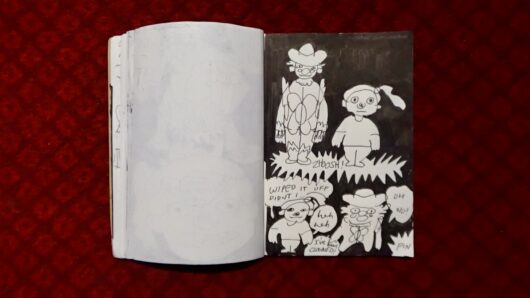
“You’ve been Clowned!” A Zine by Orson
- Chiara:Is there any aspect you would like to see develop/change within the zine-making world?
Geoff: I want it to stay random and mutant and crazy. And for everyone. Will it continue? Internet means that zines are not as important as they once were. But they are still great!
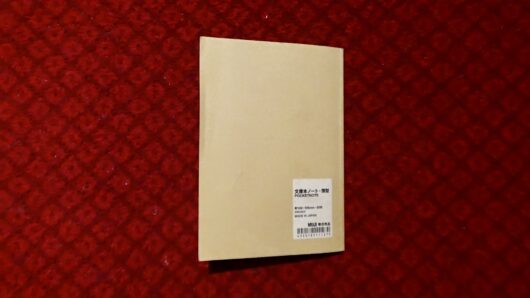
“You’ve been Clowned!” A Zine by Orson
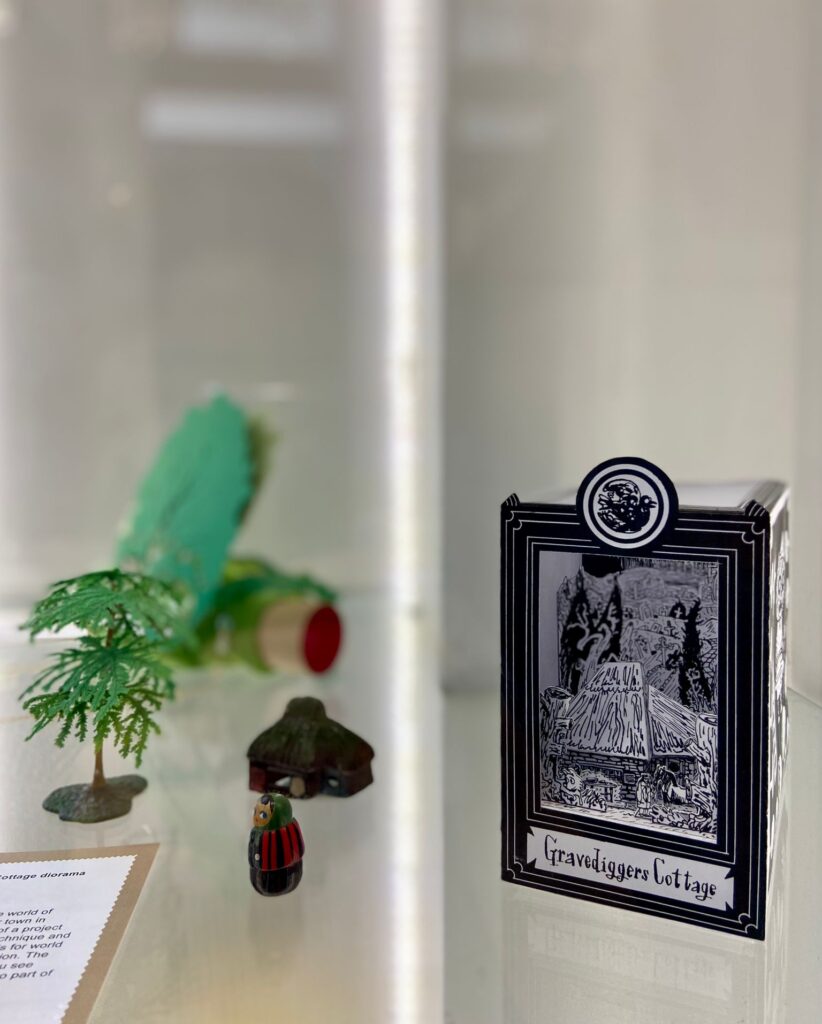
Geoff Coupland’s cut-out toy ‘Gravediggers Cottage’ based on a ceramic toy cottage for ‘Talking Toys’ an exhibition by the In-Heritage Group from UAL

